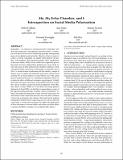| dc.contributor.author | Gillani, Nabeel | |
| dc.contributor.author | Yuan, Ann | |
| dc.contributor.author | Saveski, Martin | |
| dc.contributor.author | Vosoughi, Soroush | |
| dc.contributor.author | Roy, Deb K | |
| dc.date.accessioned | 2020-09-15T21:33:38Z | |
| dc.date.available | 2020-09-15T21:33:38Z | |
| dc.date.issued | 2018-04 | |
| dc.identifier.isbn | 9781450356398 | |
| dc.identifier.uri | https://hdl.handle.net/1721.1/127278 | |
| dc.description.abstract | Homophily - our tendency to surround ourselves with others who share our perspectives and opinions about the world - is both a part of human nature and an organizing principle underpinning many of our digital social networks. However, when it comes to politics or culture, homophily can amplify tribal mindsets and produce "echo chambers" that degrade the quality, safety, and diversity of discourse online. While several studies have empirically proven this point, few have explored how making users aware of the extent and nature of their political echo chambers influences their subsequent beliefs and actions. In this paper, we introduce Social Mirror, a social network visualization tool that enables a sample of Twitter users to explore the politically-active parts of their social network. We use Social Mirror to recruit Twitter users with a prior history of political discourse to a randomized experiment where we evaluate the effects of different treatments on participants' i) beliefs about their network connections, ii) the political diversity of who they choose to follow, and iii) the political alignment of the URLs they choose to share. While we see no effects on average political alignment of shared URLs, we find that recommending accounts of the opposite political ideology to follow reduces participants» beliefs in the political homogeneity of their network connections but still enhances their connection diversity one week after treatment. Conversely, participants who enhance their belief in the political homogeneity of their Twitter connections have less diverse network connections 2-3 weeks after treatment. We explore the implications of these disconnects between beliefs and actions on future efforts to promote healthier exchanges in our digital public spheres. | en_US |
| dc.language.iso | en | |
| dc.publisher | ACM Press | en_US |
| dc.relation.isversionof | http://dx.doi.org/10.1145/3178876.3186130 | en_US |
| dc.rights | Creative Commons Attribution 4.0 International license | en_US |
| dc.rights.uri | https://creativecommons.org/licenses/by/4.0/ | en_US |
| dc.source | ACM | en_US |
| dc.title | Me, My Echo Chamber, and I : Introspection on Social Media Polarization | en_US |
| dc.type | Article | en_US |
| dc.identifier.citation | Gillani, Nabeel et al. "Me, My Echo Chamber, and I : Introspection on Social Media Polarization." WWW '18: Proceedings of the 2018 World Wide Web Conference, April 2018, Lyon, France, ACM Press, April 2018. © 2018 IW3C2 (International World Wide Web Conference Committee) | en_US |
| dc.contributor.department | Program in Media Arts and Sciences (Massachusetts Institute of Technology) | en_US |
| dc.relation.journal | WWW '18: Proceedings of the 2018 World Wide Web Conference | en_US |
| dc.eprint.version | Final published version | en_US |
| dc.type.uri | http://purl.org/eprint/type/ConferencePaper | en_US |
| eprint.status | http://purl.org/eprint/status/NonPeerReviewed | en_US |
| dc.date.updated | 2019-07-23T17:26:34Z | |
| dspace.date.submission | 2019-07-23T17:26:35Z | |
| mit.metadata.status | Complete | |
